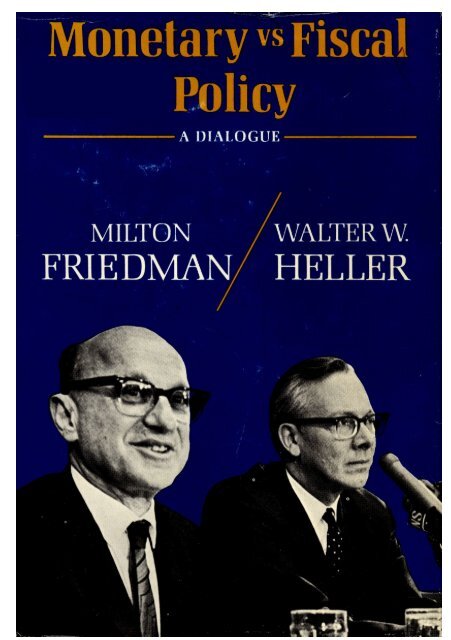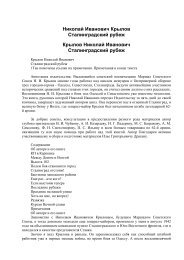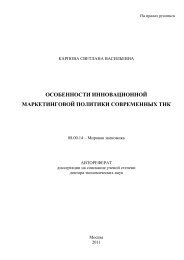You also want an ePaper? Increase the reach of your titles
YUMPU automatically turns print PDFs into web optimized ePapers that Google loves.
Monetary<br />
vs.<br />
Fiscal Policy<br />
Milton Friedman<br />
&<br />
Walter W. Heller<br />
W • W • Norton & Company • Inc •<br />
NEW YORK
SBN 393 09847 8 PAPER EDITION<br />
SBN 393 05372 5 CLOTH EDITION<br />
Copyright © 1969 by The Graduate School of Business<br />
Administration, New York University<br />
Library of Congress Catalog Card No. 7g-8ono<br />
ALL RIGHTS RESERVED<br />
Published simultaneously in Canada by<br />
George J. McLeod Limited, Toronto<br />
PRINTED IN THE UNITED STATES OF AMERICA<br />
4 5 6 7 8 9 0
Contents<br />
<strong>Foreword</strong> 7<br />
Is Monetary Policy Being Oversold / 13<br />
Walter W. Heller<br />
Has Fiscal Policy Been Oversold / 43<br />
Milton Friedman<br />
Reply / Walter W. Heller 63<br />
Reply / Milton Friedman 71<br />
NOTES 81<br />
GLOSSARY OF TERMS AND REFERENCES 89
<strong>Foreword</strong><br />
The Graduate School of Business Administration of New<br />
York University considers that one of its important missions<br />
is to provide a forum for the exchange of new ideas<br />
and knowledge which may affect the community and the<br />
country.<br />
As we prepared for the Seventh Annual Arthur K. Salomon<br />
Lecture on November 14, 1968, we decided to vary<br />
our format in an election year by having two speakers on<br />
the program instead of one as in previous years. In light of<br />
the fact that a new administration would be chosen eight<br />
days before the lecture, it was our purpose to present a<br />
meaningful dialogue on a significant economic issue of the<br />
future.<br />
Therefore, we invited two well-known apostles of economics<br />
with widely divergent viewpoints to present their<br />
opinions on what each considered the most appropriate
8 <strong>Foreword</strong><br />
means to stabilize the economy.<br />
Professor Milton Friedman, the leading spokesman for<br />
the monetarist school of thought, was asked to comment on<br />
the monetary policy which he considers necessary to accomplish<br />
economic stabilization, and Professor Walter W. Heller,<br />
the nation's foremost advocate of the neo-Keynesian<br />
economics, was called upon to discuss the importance of<br />
fiscal policy as an approach to this problem.<br />
Since each man could easily be identified with one or<br />
the other of the presidential candidates, we hoped that<br />
their confrontation would give some indication of the economic<br />
philosophy likely to affect, at least to some degree,<br />
the monetary and fiscal policies. In addition, the choice of<br />
these two outstanding economists to appear for the first time<br />
anywhere in a public debate would—we were confident—<br />
attract nationwide attention in the world of business and<br />
finance.<br />
The response exceeded our expectations. Not only was the<br />
lecture hall filled to capacity, but an overflow audience had<br />
to be served by closed-circuit television installed in several<br />
classrooms. Virtually all media gave the lecture extensive<br />
coverage and the response by the press, TV, and radio surpassed<br />
any that we had received at previous lectures in the<br />
series.<br />
Space does not permit us to enumerate at length the activities,<br />
honors, and accomplishments of the two men who<br />
shared our platform. Each is an authority on economics and<br />
related disciplines. Each is active in research agencies and<br />
in learned societies. Dr. Milton Friedman is the Paul Snowden<br />
Russell Distinguished Service Professor of Economics<br />
at the University of Chicago. Dr. Walter W. Heller is Regents'<br />
Professor of Economics at the University of Minnesota.
8 <strong>Foreword</strong><br />
In 1967, Dr. Friedman was elected president of the American<br />
Economics Association, which previously had given<br />
him the John Bates Clark Medal. He has been an economic<br />
adviser to presidential nominee Barry Goldwater and to<br />
President Richard M. Nixon. Author of many books and<br />
articles on economics, he writes a column for Newsweek<br />
magazine.<br />
Dr. Heller was appointed chairman of the President's<br />
Council of Economic Advisers by President John F. Kennedy<br />
and remained in that capacity until late in 1964. Later,<br />
he served as consultant to the Executive Office of the President<br />
during Lyndon B. Johnson's Administration. A widely<br />
published author, Dr. Heller is considered the principal economic<br />
spokesman for Keynesian economic policies. Dr.<br />
Friedman, on the other hand, is considered one of the principal<br />
critics of such economic policies.<br />
The Friedman-Heller lecture, as presented in these pages,<br />
includes some revisions of the verbal exchange. Notes and a<br />
glossary of terms and references have been added for the<br />
convenience of the reader.<br />
JOSEPH H. TAGGART<br />
DEAN OF THE GRADUATE SCHOOL<br />
OF BUSINESS ADMINISTRATION,<br />
EXECUTIVE DEAN OF THE SCHOOLS<br />
November 14, 1g68<br />
OF BUSINESS, NEW YORK UNIVERSITY

















